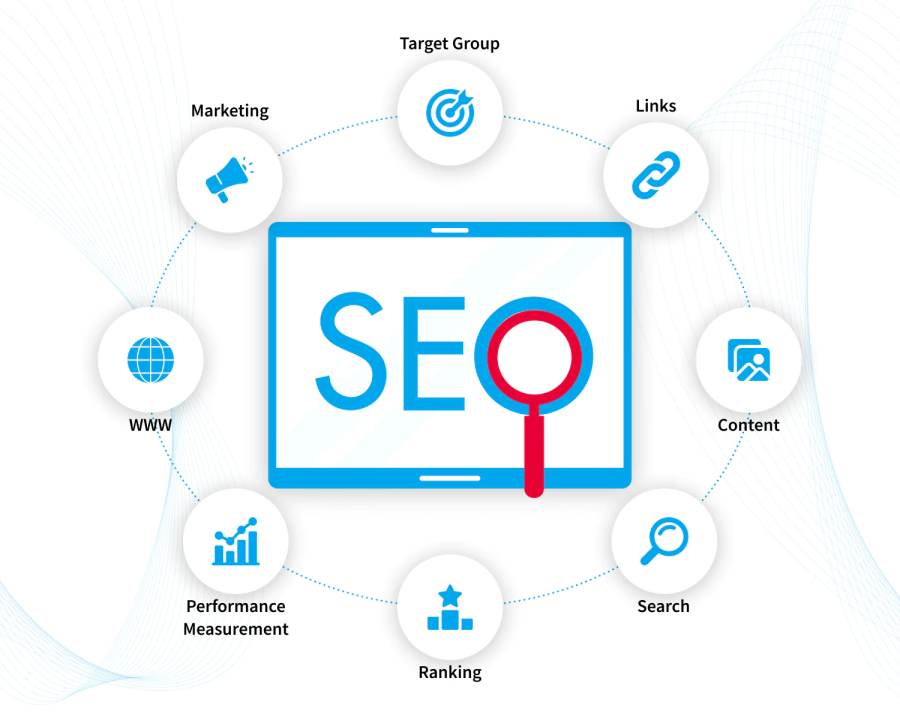SEO Strategies in Digital Marketing: What Works in 2025

Search Engine Optimization (SEO) remains one of the most powerful tools in digital marketing. As algorithms evolve and user behavior shifts, your SEO strategy must stay up to date — not just to rank, but to stay competitive.
In 2025, SEO is no longer just about keywords or backlinks. It’s about intent, user experience, content quality, and how your brand solves real problems. In this blog, we’ll explore the most effective SEO strategies in digital marketing today, and how you can implement them to drive traffic, build trust, and grow your business.
1. Understanding SEO’s Role in Digital Marketing
SEO isn’t a one-time fix — it’s an ongoing strategy that works hand-in-hand with content marketing, social media, paid ads, and email campaigns. When done right, SEO helps your website:
-
Appear in top search results
-
Attract organic traffic without paying for ads
-
Build brand authority and trust
-
Convert visitors into leads or sales
-
Outrank your competitors in the long term
In a world flooded with content, good SEO is how your brand gets found first.
2. Keyword Research: Still the Foundation (But Smarter Now)
Keyword research has changed. It’s not about stuffing keywords into content anymore — it’s about understanding search intent.
Strategy:
-
Focus on long-tail keywords and question-based searches
-
Use tools like Google Search Console, Semrush, or Ubersuggest to find what people are actually looking for
-
Understand whether the search is informational, navigational, or transactional
2025 Trend:
Use AI-powered keyword tools that show voice search patterns and conversational keywords — because more users now search via voice or AI assistants.
3. E-E-A-T: Build Trust Through Content
E-E-A-T stands for Experience, Expertise, Authoritativeness, and Trustworthiness. Google has made it clear: they want to rank credible and helpful content, especially in sensitive niches like health, finance, or news.
Strategy:
-
Write content that reflects real-life experience (e.g., case studies, examples, reviews)
-
Highlight the author’s expertise — add bios or credentials
-
Link to credible sources
-
Keep your content updated and accurate
-
Use HTTPS and clean website design to build user trust
If you want to rank, you must show that your content isn’t just well-written — it’s reliable and created by people who know what they’re talking about.
4. On-Page SEO: Details That Matter
Even in 2025, small on-page SEO tweaks make a big difference. They help Google understand what your page is about and improve the user experience.
Checklist:
-
Optimize title tags and meta descriptions
-
Use H1–H3 headers with target keywords
-
Add alt text to all images
-
Use internal linking to guide users to other relevant pages
-
Make sure your URLs are short, clean, and keyword-rich
Bonus:
Add structured data (schema markup) for things like FAQs, reviews, events, and products — it can improve visibility with rich results.
5. High-Quality Content: The King Still Reigns
SEO without good content is pointless. Google’s algorithm updates (like the Helpful Content Update) continue to reward valuable, human-first content.
Strategy:
-
Write for humans first, search engines second
-
Answer questions clearly and completely
-
Break content into sections using headings and bullet points
-
Add visuals, charts, videos, or infographics to boost engagement
-
Keep it original — avoid copying or spinning content from other sites
2025 Focus:
Content should be solution-driven. People are not just browsing; they want answers fast. So structure your content to be scannable, useful, and easy to digest.
6. Mobile-First + Core Web Vitals: Speed & UX Matter
Most users now access websites via mobile. Google’s mobile-first indexing means your mobile site is what’s considered for ranking.
In addition, Google’s Core Web Vitals measure the performance and usability of your site. A slow or glitchy experience can drop your rankings.
Strategy:
-
Use a responsive design that looks great on any screen
-
Optimize site speed — compress images, reduce scripts
-
Improve Largest Contentful Paint (LCP), First Input Delay (FID), and Cumulative Layout Shift (CLS)
-
Avoid intrusive pop-ups and auto-playing videos
-
Test your site with Google PageSpeed Insights or Lighthouse
7. Voice Search Optimization
With smart speakers, voice assistants, and AI chatbots rising, voice search is changing how people find information.
Strategy:
-
Focus on natural, conversational keywords
-
Answer questions clearly — aim for featured snippets
-
Use FAQ sections on relevant pages
-
Optimize for local voice searches like “best pizza near me” or “SEO expert in East London”
Voice SEO is growing — be prepared to rank in that space too.
8. Local SEO: Crucial for Service-Based and Retail Businesses
If your business serves a specific area, local SEO is key. Google’s Local Pack (those top map results) drives serious traffic and calls.
Strategy:
-
Claim and optimize your Google Business Profile
-
Add accurate NAP (Name, Address, Phone) across all platforms
-
Collect and respond to Google reviews
-
Use location-specific keywords (e.g., “plumber in Camden”)
-
Create location-based landing pages for each service area
Local SEO helps you rank not just in search results but in Google Maps, which is where many customers start their journey.
9. Link Building: Quality Over Quantity
Backlinks still matter — they’re like votes of confidence from other websites. But in 2025, it’s all about quality and relevance, not mass directories or spammy guest posts.
Strategy:
-
Create link-worthy content — ultimate guides, original research, or helpful tools
-
Do outreach to blogs and websites in your niche
-
Get links through digital PR, interviews, and features
-
Use HARO (Help A Reporter Out) or similar platforms to be quoted as an expert
-
Avoid shady link schemes — Google’s spam filters are smarter than ever
10. AI and SEO: What to Know in 2025
AI tools are now part of the SEO process — from content writing to keyword research and analytics.
Smart Uses:
-
AI-generated content drafts (but always human-edited)
-
Predictive SEO tools that analyze ranking trends
-
AI chatbots to improve on-site engagement
-
Personalized content recommendations based on user data
However, don’t rely on AI to do everything. Google rewards original, human-quality content, not generic AI articles.
Final Thoughts
SEO is no longer a technical side job — it’s the core of your digital marketing strategy. In 2025, successful SEO is about balancing technical optimization with genuine value. It’s about creating content that’s useful, trustworthy, and designed with both the user and the algorithm in mind.
If you want long-term growth and real visibility online, invest in strong SEO. It’s not instant, but the results compound — and the return is worth it.







Leave a Comment